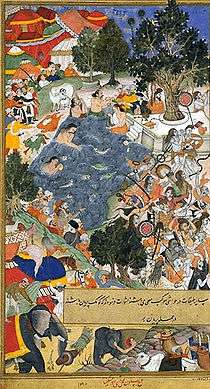Battle of Thanesar
| Battle of Thanesar | |||||||
|---|---|---|---|---|---|---|---|
| Part of Mughal-Rajput War 1558-1578 | |||||||
 Akbar viewing the Mughal army killing sannyasis, Akbarnama (1590-1596) | |||||||
| |||||||
| Belligerents | |||||||
| Mughal Empire | Two rival groups of Sanyasis | ||||||
| Commanders and leaders | |||||||
|
Akbar Mehtar Khan Ghazi Khan Badakshani | |||||||
| Strength | |||||||
|
8000 men 2 cannons 400 Matchlocks 75 War elephants | 800-1000 Sanyasi's | ||||||
| Casualties and losses | |||||||
| 5-10 wounded, | 50-150 killed | ||||||
Battle of Thanesar, (also known as the Battle of the Ascetics)[2] was fought during the summer in the year 1567, near Thanesar on the banks of the Sarsawati Ghaggar River in the state of Haryana. While the Mughal Emperor Akbar was on his campaign to subdue the renegade Rajputs, he set up camp at a water Qanat and established camp around that fresh water reservoir in order to properly manage his forces in the nearby regions.[3]
Occupation
After staying at the Qanat for weeks during the scorching summer heat, Akbar and the Mughals encountered a very large group of Sanyasis. The ascetics approached and entered the Mughal camp with complete disregard for the Mughal military standard and Red tents symbolizing the Emperor himself. Akbar was generally displeased at their arrival because he was gathering his armies, constructing morale and preparing for his next campaign against Udai Singh. However the main intentions of the Sanyasi group was to drink and bathe in the Qanat, which they considered "Holy".[4]
As the summer afternoon began to scorch another group of Sanyasis arrived they began to gather in their hundreds and thousands around the Qanat. Outraged by their presence and intrude Abdul Hasan Asaf Khan advised the Mughal Emperor Akbar to take action. The Mughals were waiting for an opportunity to drive the priests out of their encampment, but Akbar believed that they would leave by sunset.
Battle

The Mughal Emperor Akbar, continued to concede the Qanat to the Sanyasis and carefully observed their actions. As the "first" large group of priests bathed and drank from the Qanat, a "second" group of priests also began to arrive in their hundreds. It was due to the arrival of the second group that tensions ignited among the two large groups, that eventually culminated in a brawl inside the Qanat and almost immediately the two rival groups of Sanyasis began to stab each other using Kitars.[5]
Concerned that the violence might spread into the Mughal encampment, the Mughal Emperor Akbar ordered almost 250 of his men to immediately retake the Qanat from the schismatic priests. The Mughals armed with Talwars, piked-shields, Matchlocks and Composite Bows and Arrows, ferociously overwhelmed the ranks of priests ultimately driving them away from the Qanat according to their jurisdiction, which justified the usage of force.[6]
Aftermath
The Mughal Emperor Akbar continued to command his campaign from Thanesar, and within the coming months the Mughals organized one of the well documented Siege of Chittorgarh against the forces of the renegade Udai Singh II at Chittorgarh Fort.
Akbar had learnt a valuable lesson from this event and passed a Firman banning any commoner from entering any Mughal encampments without a credible reason.
See also
References
- ↑ "Akbar". Retrieved 11 December 2014.
- ↑ "Basawan - Akbar Watches a Battle Between Two Rival Groups - masterworks of painting". Retrieved 11 December 2014.
- ↑ "Basawan - Name - V&A Search the Collections". Retrieved 11 December 2014.
- ↑ "chittor - airavat". Retrieved 11 December 2014.
- ↑ "Imaging Sound". Retrieved 11 December 2014.
- ↑ https://3086150802460984893-a-1802744773732722657-s-sites.googlegroups.com/site/airavat/Akbar_massacre_sannyasis.jpg?attachauth=ANoY7crJZ0rVpUFmpDq9RpuYxrECmEGmF7RN2H0caXQzbf9IoGggb2QUkfCd9svO_JL93Ta8OZR7KOWxQy4uEJezgz_JEGn-vOpMsXwdZXZUBuc_m8DbFn93HK1ZcDpbYzwuDVh7M7nVdAoFp644w7y_h2qNpyVl_l4rCx6OzLzWRLd8N40h91Rk8ntOvQh-luA3zaTQLk3kJ2Rxy325OUlUiGG8GhyLcg%3D%3D&attredirects=0[]